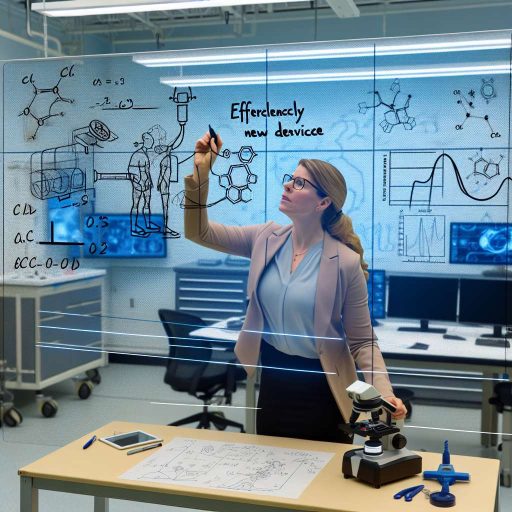Understanding the Role of Chemical Engineers in Today’s Industry
Core Responsibilities of Chemical Engineers
Chemical engineers design processes for producing chemicals efficiently.
They optimize the use of raw materials and energy.
Moreover, they focus on safety and environmental impact.
Communication plays a vital role in their daily tasks.
Chemical engineers collaborate with various teams to achieve goals.
Industries Employing Chemical Engineers
Chemical engineers find opportunities in diverse industries.
The petrochemical industry is one of the largest employers.
Pharmaceutical companies rely on their expertise for drug development.
Food processing and agriculture also benefit from their skills.
Additionally, environmental sectors seek their knowledge for sustainability.
Importance of Innovation in Chemical Engineering
Innovation drives advancements in chemical engineering practices.
Chemical engineers work on developing new materials and processes.
This innovation often leads to more sustainable production methods.
Furthermore, it enhances product safety and performance.
Education and Continuous Learning
A degree in chemical engineering is essential for entry-level positions.
Advanced degrees can open doors to higher-level roles.
Moreover, continuous learning is crucial in this evolving field.
Chemical engineers often take part in workshops and seminars.
Professional organizations offer valuable resources for ongoing education.
Key Skills for Success in Chemical Engineering
Critical thinking is a must-have skill for chemical engineers.
They need strong analytical abilities to solve complex problems.
Effective communication skills enhance teamwork and project outcomes.
Moreover, discipline and project management skills are essential.
Finally, adaptability ensures they can navigate industry changes.
Educational Pathways: Degrees and Certifications for Chemical Engineers
Understanding Degree Options
Pursuing a degree in chemical engineering is essential for your career.
Unlock Your Career Potential
Visualize a clear path to success with our tailored Career Consulting service. Personalized insights in just 1-3 days.
Get StartedA bachelor’s degree is the minimum requirement in this field.
Many universities offer accredited programs that provide strong foundations.
Consider pursuing a master’s degree for advanced study and specialization.
This degree can open doors to managerial roles and research opportunities.
Ph.D. programs are available for those interested in academic or advanced research careers.
Key Certifications to Enhance Your Credentials
Obtaining professional certifications can boost your career prospects.
The Fundamentals of Engineering (FE) certification is an important first step.
This certification demonstrates your understanding of essential engineering principles.
After gaining experience, consider pursuing the Professional Engineer (PE) license.
The PE license allows you to practice engineering independently and enhances credibility.
Additionally, specialized certifications, such as Six Sigma or Project Management Professional, can set you apart.
Importance of Continued Education
Continued education is crucial in the rapidly evolving field of chemical engineering.
Staying updated on the latest technologies and practices is vital for success.
Consider attending workshops, webinars, or professional conferences regularly.
Moreover, online courses provide flexible options to deepen your knowledge.
Participating in industry-related training programs can also be beneficial.
Networking and Professional Organizations
Joining professional organizations can significantly advance your career.
Organizations like the American Institute of Chemical Engineers (AIChE) offer valuable resources.
These resources include networking opportunities and access to industry research.
Participating in local chapter events can help you connect with experienced professionals.
Networking can lead to mentorship opportunities that are invaluable in your career.
Gaining Relevant Experience: Internships and Co-op Programs
The Importance of Internships
Internships serve as a pivotal foundation for your chemical engineering career.
They provide real-world experience in a professional setting.
Internships enhance your technical skills and understanding of industry practices.
Moreover, they allow you to apply classroom knowledge in practical situations.
Companies often view interns as future employees, which opens job opportunities.
Finding the Right Internship
Choosing the right internship is crucial for career advancement.
Start by researching companies that align with your career goals.
Check their values and work culture to ensure a good fit.
Utilize university career centers for resources and connections.
Networking can lead to insightful internship opportunities in chemical engineering.
Application Strategies
Craft a tailored resume highlighting your skills and experiences.
Write a personalized cover letter that addresses the specific position.
Prepare for interviews by practicing common questions in the industry.
Follow up with thank-you notes post-interview to express gratitude.
Co-op Programs: An Alternative Path
Co-op programs integrate academic studies with professional work experience.
These programs usually span multiple terms and provide extensive training.
As a co-op student, you might work at the same company for several semesters.
This continuity fosters deeper learning and mentorship opportunities.
Benefits of Co-op Experience
Co-op positions often come with higher responsibilities compared to internships.
They present the chance to work on significant projects within the company.
Additionally, many co-op programs offer competitive pay and benefits.
These positions frequently lead to job offers upon graduation.
Building a Professional Network
Internships and co-ops help you connect with professionals in the field.
Attend industry events and conferences to expand your network.
Engage with mentors who can offer guidance and career advice.
Utilize platforms like LinkedIn to showcase your achievements and connect with others.
Long-Term Career Growth
The experience gained from internships and co-ops significantly boosts your resume.
Employers favor candidates who demonstrate practical experience.
As you grow your skills, you’ll feel more confident in your career journey.
Ultimately, these experiences lay the groundwork for a successful career in chemical engineering.
Learn More: How Chemical Engineers Impact Everyday Life
Networking Strategies: Building Professional Relationships
Creating Meaningful Connections
Begin by identifying your networking goals.
Know what you want to achieve through networking.
Attend industry events and conferences regularly.
These settings provide opportunities to meet others.
Engage in conversations with professionals from different backgrounds.
Listen actively and express genuine interest in their work.
Follow up after events with a personalized message.
This helps reinforce the connection you’ve made.
Utilizing Online Platforms
Leverage social media for professional growth.
LinkedIn is an essential tool for networking.
Create a compelling and authentic profile.
Share relevant content that showcases your expertise.
Join industry-related groups and participate in discussions.
Connect with peers and leaders in your field.
Be proactive in sending requests to expand your network.
Developing Long-Lasting Relationships
Build trust by being reliable and supportive.
Offer assistance to others when possible.
Schedule regular check-ins to maintain relationships.
These efforts show you value the connection.
Share updates about your career and achievements.
Celebrate others’ successes to strengthen ties.
Networking is an ongoing process that pays dividends.
Participating in Professional Organizations
Joining relevant organizations enhances your credibility.
Engage in committees or volunteer opportunities.
These experiences help you meet like-minded individuals.
Developing leadership skills through involvement is beneficial.
Attend meetings, workshops, and social events regularly.
These interactions can lead to collaboration opportunities.
Additionally, you can gain insights from industry leaders.
Uncover the Details: Why Choose Metallurgical Engineering as a Career Path
Staying Updated: Continuous Learning and Professional Development
The Importance of Lifelong Learning
Lifelong learning is crucial in chemical engineering.
This field rapidly evolves with new technologies and practices.
Thus, staying informed enhances your professional edge.
Moreover, ongoing education helps you adapt to changes.
Engaging with Professional Organizations
Joining professional organizations boosts your network.
Organizations like AIChE offer valuable resources.
Additionally, they provide access to conferences and seminars.
These events foster knowledge exchange among peers.
Networking can lead to new job opportunities.
Pursuing Certifications and Advanced Degrees
Certifications can enhance your credentials significantly.
Look for programs relevant to your specialization.
Advanced degrees often lead to higher positions.
Investing in education pays off in the long term.
Online Courses and Webinars
Many platforms offer online courses tailored for engineers.
Webinars keep you updated on industry trends.
These resources allow for flexible learning schedules.
You can learn at your own pace and convenience.
Reading Industry Publications
Staying updated involves reading scientific journals.
These publications cover the latest research findings.
Additionally, trade magazines provide insights on industry developments.
Subscribe to newsletters for regular updates.
Participating in Workshops and Conferences
Attending workshops enhances practical skills.
Conferences provide exposure to innovative technologies.
These events offer an avenue for hands-on learning.
You can engage with experts in the field.
Mentorship and Peer Learning
Finding a mentor can accelerate your growth.
Mentors provide guidance and share valuable experiences.
Engaging with peers fosters collaborative learning.
Regular discussions can spark new ideas.
Setting Personal Development Goals
Establish concrete goals for professional growth.
Define what skills you want to develop this year.
Track your progress to stay motivated.
Set milestones to celebrate achievements.
Delve into the Subject: How Aerospace Engineers Impact Modern Technology

Industry Trends: How to Align Your Skills with Market Demands
Emerging Technologies
Chemical engineering is rapidly evolving with new technologies.
Automation and artificial intelligence are reshaping the industry.
Stay updated on advancements in process modeling and simulation.
Familiarize yourself with machine learning applications in chemical processes.
Sustainability Practices
Sustainability has become a key focus in chemical engineering.
Learn about green chemistry and its importance in modern practices.
Understand how to reduce waste and emissions in your projects.
Engage with sustainable design methods to enhance your skillset.
Market Demand for Interdisciplinary Skills
The industry increasingly values diverse skill sets.
Consider developing expertise in data analysis and project management.
Collaboration with other engineering disciplines is essential.
Enhancing communication skills will improve your team dynamics.
Professional Development Opportunities
Seek continual education through workshops and online courses.
Attend industry conferences to network with peers and leaders.
Explore certification programs to validate your expertise.
Participate in research initiatives to stay ahead of trends.
Networking and Building Relationships
Networking opens doors to new job opportunities and collaborations.
Join professional organizations related to chemical engineering.
Leverage social media to connect with industry experts.
Establish mentors who can offer guidance in your career journey.
You Might Also Like: Chemical Engineering Internships and Career Growth
Certification and Licensing: Professional Engineer (P.Eng) Requirements
Understanding the P.Eng Designation
The Professional Engineer (P.Eng) designation is crucial for chemical engineers in many regions.
This certification signifies that engineers meet specific competency standards.
Acquiring this title demonstrates a commitment to the profession.
Employers often prefer candidates with P.Eng certification for advanced positions.
Eligibility Criteria
To apply for the P.Eng designation, candidates must meet several requirements.
First, an accredited engineering degree is necessary.
Next, candidates must complete a minimum of four years of relevant work experience.
This experience should be gained under the supervision of a licensed engineer.
Additionally, candidates must show evidence of professional development activities.
Application Process
The application process begins with submitting your credentials to the licensing body.
Each jurisdiction has its own engineering regulatory body.
Therefore, check the specific requirements for your location.
After submission, a review of qualifications takes place.
If approved, candidates must pass a professional practice examination.
Importance of Professional Development
Continuous professional development is essential for maintaining the P.Eng designation.
Engineers must stay updated on industry trends and technologies.
This can include attending workshops, conferences, and additional coursework.
Active participation in professional organizations also enhances career prospects.
Maintaining Your License
Once earned, the P.Eng designation requires regular renewal.
Engineers need to report their professional development activities regularly.
Failing to meet these requirements can result in losing the license.
Staying engaged in the engineering community is beneficial for compliance.
Leadership Skills for Advancing to Management Positions
Importance of Leadership in Chemical Engineering
Leadership plays a crucial role in chemical engineering careers.
Strong leadership drives team success and project efficiency.
Furthermore, it influences workforce morale and motivation levels.
Key Leadership Skills to Develop
Effective communication is vital for any leader.
Active listening fosters a collaborative environment among teams.
Moreover, clear articulation of goals enhances understanding and focus.
Decision-making skills are equally important.
Leaders must analyze data and assess risks effectively.
Additionally, being decisive instills confidence within teams.
Emotional intelligence greatly contributes to successful leadership.
This skill aids in understanding team dynamics and individual needs.
Thus, leaders can manage conflicts and build strong relationships.
Building a Leadership Presence
Establishing credibility is the first step in building leadership presence.
Being knowledgeable about industry trends enhances a leader’s reputation.
Furthermore, continual professional development shows commitment to growth.
Leaders should also demonstrate accountability in their actions.
Owning up to mistakes fosters an environment of trust.
This transparency encourages teams to take ownership of their responsibilities.
Networking and Mentorship
Networking is essential for professional advancement in engineering.
Building connections within the industry opens new opportunities.
It helps in learning from peers and industry leaders.
Finding a mentor can significantly impact one’s career trajectory.
A mentor provides guidance and valuable insights into navigating challenges.
Moreover, mentorship can accelerate the development of leadership skills.
Taking Initiative and Seeking Opportunities
Leaders should actively seek projects that challenge their skills.
This helps in showcasing leadership potential within their organization.
Taking initiative demonstrates commitment to personal and professional growth.
Additionally, volunteering for leadership roles within teams is beneficial.
This experience provides practical insight into managing diverse personalities.
Moreover, it enhances the ability to lead under pressure.
Continuous Learning and Adaptation
Leadership requires a commitment to continuous learning.
Stay updated with the latest technological advancements in the field.
This knowledge promotes adaptability in ever-changing work environments.
Additionally, investing time in professional training programs is advantageous.
These programs often focus on developing soft skills crucial for leadership.
Consequently, it broadens perspectives and enhances problem-solving abilities.
Additional Resources
Advancing Sustainable Materials and Technologies: An Interview …




